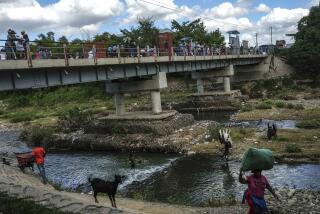Joyful Reunions as Borders Open
HELMSTEDT, West Germany — It was like a national family reunion.
There were tears, smiles and scenes of unrestrained joy, mixed with disbelief that what was happening was really happening.
After three decades as the industrialized world’s most penned-in people, East Germans suddenly learned that they were free to come and go as they pleased.
And they did.
In the first 24 hours after the Communist regime threw open its borders, more than 70,000 East Germans passed through what had been the Iron Curtain and crossed into West Germany.
At the Hirschberg checkpoint north of Nuremberg, traffic was backed up for nearly 40 miles at times Friday, and there were long waits at all other crossings.
At the Helmstedt crossing, as at other points along the 860-mile frontier, West Germans lined the road to cheer and wave as East Germans in little Trabant and Wartburg cars sputtered across to the West.
Years of being forbidden to travel have produced a kind of national neurosis in East Germany. They call it fernweh --wanderlust, a longing to travel. Fernweh was clearly demonstrated Friday.
Some East Germans cheered and applauded in their cars as they left their homeland for the first time. One shouted, “Finally! Finally!”
Coming to a land that most had seen only on their television screens, the East Germans were received as long-lost relatives.
Some West Germans pressed 10-mark notes (about $6) into the hands of East Germans as they entered the country.
Several miles into West Germany, small groups of people stood along the highways and on overpasses, waving at East German cars as they passed.
In West Berlin, Mayor Walter Momper told a crowd of people, “We Germans are the happiest people on Earth.”
In a country that has experienced few such moments of joy in this century, it was an experience unlikely to be forgotten. Indeed, some people have already suggested that Nov. 9, the day the border was opened, should be made the German national day. At present, West Germans celebrate on June 17, the date of the brief uprising in East Germany in 1953.
In Helmstedt, the main square and pedestrian shopping areas were crowded with Germans, East and West, talking and smiling and gesturing animatedly. For Germans on both sides of the border, it was a day of celebration.
Many of the East Germans were from frontier areas so close that they were once within the Helmstedt city limits. On Friday, they stood in the main square for the first time, dazed, excited, dumbstruck.
“I just don’t believe this is happening,” a young East German foundry worker said, clinging to his wife and daughter.
“We’ve hoped for this for 40 years,” Helmstedt City Manager Lothar Wien said. “Relatives who live only a few miles from each other can actually visit. It’s hard to describe the depth of feeling in all this. It’s a huge reunion.”
Where words failed, gestures sometimes made the point.
East Germans returning to hastily, illegally parked cars in Helmstedt’s main square found marigolds instead of tickets under their windshield wipers.
Those who looked into the Ratskeller restaurant next to the town hall found it hard to get away.
“They can’t buy a drink in here,” the manager, Werner Dyga, said.
At the town hall, East Germans collected 100 marks in “welcome money,” the equivalent of $60, then gaped at the brightly lit affluence of the new world that surrounded them.
Most of the East Germans came briefly, apparently to test their new freedom, as if pinching themselves to make sure it wasn’t all some cruel joke.
Those who shopped bought carefully, as if they planned to return.
A young East German office manager, asked what he had bought, replied, “Bananas, grapefruit and something colorful for my children.”
Of the 8,500 East Germans who crossed at Helmstedt, only 500 asked for permanent resettlement.
The decision to open the borders was viewed as a final, desperate gamble on the part of an East German government on the edge of collapse. In the knowledge that 1.4 million East Germans had already applied to emigrate before Thursday’s dramatic move, West German authorities braced themselves for the possibility of an enormous exodus.
The 175,000 to 200,000 East Germans who fled in the eight weeks before Thursday’s move have placed a severe strain on West Germany’s ability to house and provide jobs for the new arrivals.
Officials in some cities, including Frankfurt and Hanover, have said they are unable to absorb additional newcomers.
“We’ve only come for the day,” said Irena Tuerk, a Magdeburg schoolteacher, moments after she set foot in the West for the first time. “My grandson has to be in school in the morning.” The child was in the back seat of her car.
At first, East German authorities had insisted that people traveling to the West have a special police stamp on their identity cards. But by early afternoon, the people coming in said they had been passed through with no formalities.
West German officials expect an even greater number of East German travelers this weekend.
City Manager Wien said he had approved a request from Magdeburg, East Germany’s fourth-largest city, to operate a bus service to Helmstedt starting today.
More to Read
Sign up for Essential California
The most important California stories and recommendations in your inbox every morning.
You may occasionally receive promotional content from the Los Angeles Times.










